Benefits of Cloud Computing in Healthcare for Service Providers
Table Of Content
Published Date :
22 Sep 2025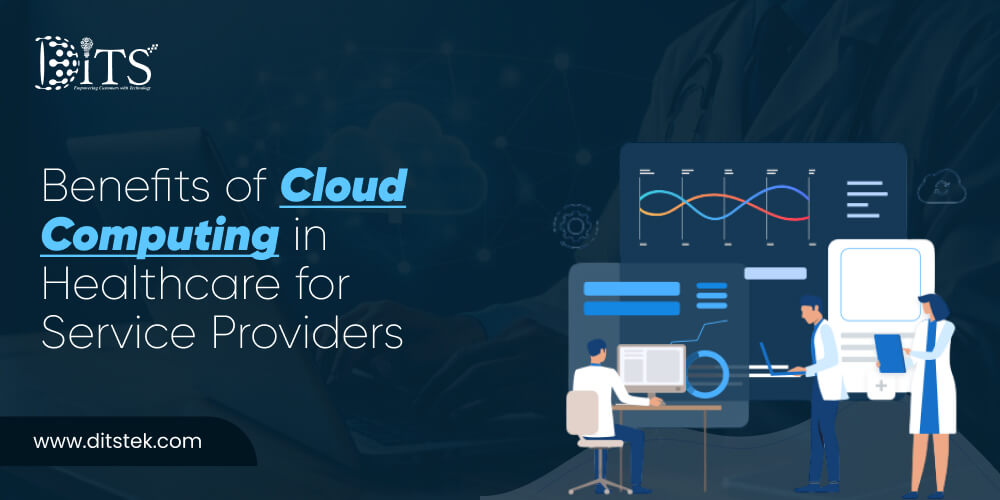
The healthcare industry is undergoing a major digital transformation, and one of the most impactful drivers is cloud computing in healthcare. From improving access to patient records to enabling secure remote consultations, cloud solutions are helping providers deliver faster, safer, and more efficient care. According to a MarketsandMarkets report, the global healthcare cloud computing market is projected to reach over USD 89 billion by 2027, reflecting its growing importance in everyday medical practices.
By moving critical workflows and data to the cloud, healthcare providers gain the ability to scale resources, ensure compliance with data privacy laws, and streamline operations. More importantly, cloud adoption allows hospitals, clinics, and practitioners to focus on what matters most—improving patient outcomes while reducing operational complexities.
Enhancing Electronic Health Records (EHR) Management
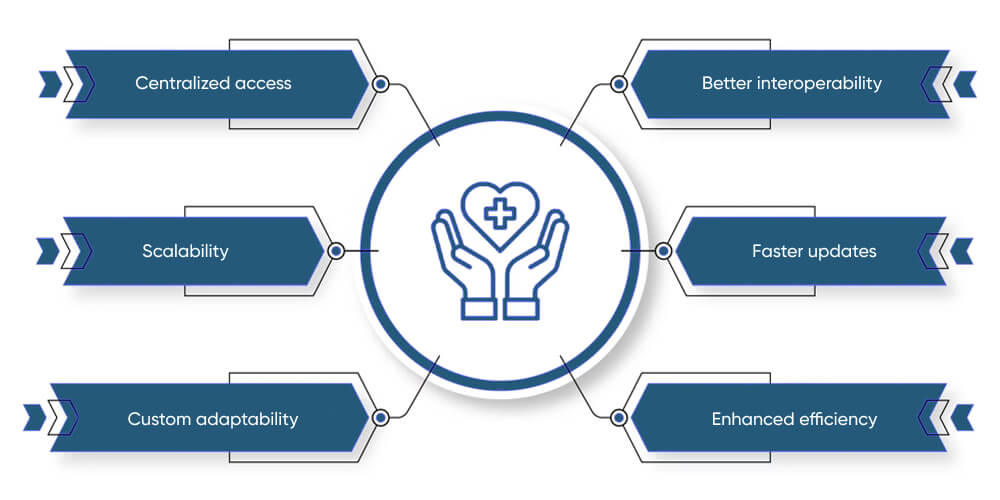
Managing Electronic Health Records (EHR) is one of the most effective uses of cloud computing healthcare. Here’s how providers benefit from adopting cloud-based EHR systems:
Centralized access
Authorized healthcare staff can securely access patient records anytime and anywhere, allowing doctors, nurses, and administrators to provide more coordinated care without the delays often caused by physical or siloed records.
Better interoperability
Cloud platforms make it easier for different healthcare systems and providers to share and exchange data seamlessly, ensuring that a complete patient history is available when making critical treatment decisions.
Scalability
Unlike traditional systems that require expensive hardware upgrades, cloud-based EHRs can grow as patient data increases, helping healthcare providers manage large volumes of records cost-effectively.
Faster updates
Cloud-based systems are easier to maintain and update, which ensures that healthcare organizations always remain compliant with evolving regulations while keeping their records accurate and secure.
Custom adaptability
Through custom healthcare solutions, providers can tailor EHR workflows to their own operational requirements, ensuring the technology supports their care processes instead of forcing them to adjust to rigid systems.
Enhanced efficiency
With better access, interoperability, and faster updates, medical teams spend less time on administrative work and more time on patient-centered care, ultimately improving service delivery.
Ready to Transform Patient Care with Cloud?
Discover how healthcare cloud computing drives efficiency, security, and patient outcomes. Take the first step toward innovation today.
Supporting Telemedicine and Virtual Care
Telemedicine adoption has grown rapidly, and healthcare cloud computing is at the core of this expansion. Here’s how cloud solutions enable effective virtual care services:
Secure video consultations
Cloud-powered platforms allow encrypted, high-quality video calls, ensuring patients and doctors can interact remotely while maintaining confidentiality and meeting regulatory security standards.
Digital health record integration
Telemedicine sessions are automatically linked with patient Electronic Health Records, creating a seamless, continuous patient history that reduces errors and improves care continuity.
Scalability during demand spikes
During health crises like pandemics, cloud systems scale effortlessly to handle thousands of online consultations, ensuring patients continue to receive care without interruptions.
Remote accessibility
Patients in rural or underserved regions can consult doctors from the comfort of their homes, eliminating travel barriers and ensuring more inclusive access to healthcare.
Continuous care through monitoring
Providers can use remote patient monitoring tools powered by the cloud to track patient vitals, manage chronic illnesses, and intervene proactively before conditions worsen.
Improved patient experience
The convenience of telehealth, combined with timely monitoring and integration with EHRs, leads to greater patient satisfaction and long-term engagement with healthcare providers.
Data Security and Compliance with Regulations
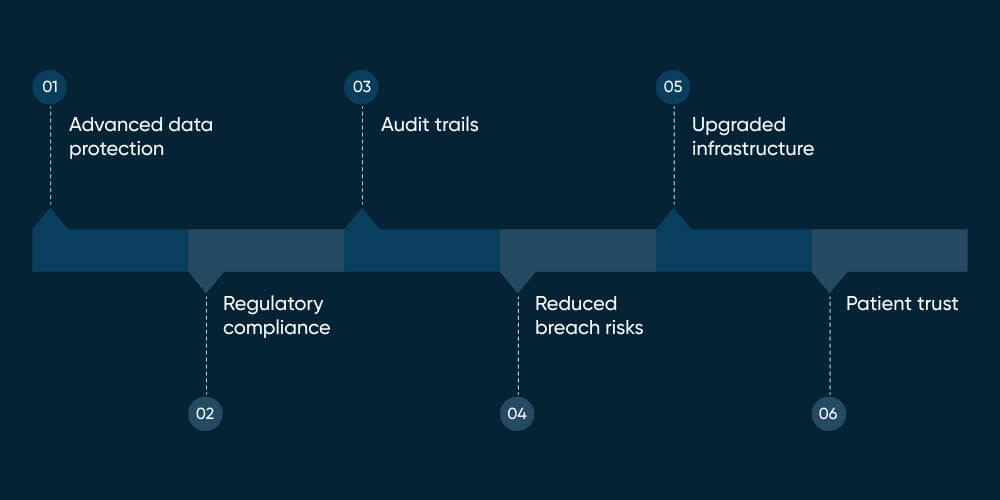
Data privacy is non-negotiable in healthcare, and cloud computing for healthcare ensures organizations remain secure and compliant. Here’s how cloud solutions protect sensitive medical information:
Advanced data protection
Cloud platforms provide built-in security measures such as encryption, firewalls, and multi-factor authentication, ensuring that sensitive medical data remains protected against unauthorized access or cyberattacks.
Regulatory compliance
Healthcare organizations must comply with strict rules like HIPAA or GDPR. Cloud providers design their systems to meet these standards, helping institutions maintain compliance with less effort.
Audit trails
Cloud systems generate detailed logs of who accessed data and when, creating transparency and accountability that is critical for internal monitoring and external audits.
Reduced breach risks
With real-time monitoring, automated alerts, and threat detection, cloud platforms reduce the likelihood of security breaches that could compromise patient trust or damage organizational reputation.
Upgraded infrastructure
Many organizations still rely on outdated systems. By using Legacy Modernization Services, they can migrate to secure cloud-based platforms with stronger compliance frameworks and better resilience.
Patient trust
When patients know their medical information is securely stored and accessible only by authorized providers, they are more willing to adopt digital healthcare services with confidence.
Want to Enhance Your EHR Experience?
Move beyond outdated systems with cloud-based EHR that scales, integrates, and supports better patient care for your organization.
Improving Collaboration Among Healthcare Teams
Collaboration is essential in healthcare, where multiple professionals work together to ensure the best patient outcomes. With healthcare cloud computing, teamwork becomes more efficient and streamlined in the following ways:
Real-time access to patient data
Doctors, nurses, and specialists can instantly review and update lab reports, diagnostic images, and care notes, eliminating delays and ensuring that treatment decisions are based on accurate, up-to-date information.
Cross-location communication
Healthcare providers often work across different branches or even cities. Cloud-based platforms make it easy to share files and updates instantly, supporting seamless collaboration regardless of geographic barriers.
Integrated communication tools
Many healthcare cloud systems come with secure messaging, chat, and video conferencing features, which enable teams to discuss cases quickly without risking sensitive information being shared on unsecured channels.
Centralized resource sharing
Instead of storing data in disconnected systems, cloud platforms consolidate resources in one place. This allows every authorized team member to access essential documents, reducing duplication and miscommunication.
Improved decision-making
When specialists, nurses, and administrative staff can all access the same data and communicate instantly, treatment decisions are made faster, improving both efficiency and the quality of patient outcomes.
Operational efficiency
Cloud-driven collaboration tools minimize administrative overhead, such as paperwork and manual coordination. This gives medical professionals more time to focus on patient care rather than logistics or redundant tasks.
Leveraging Big Data and Analytics
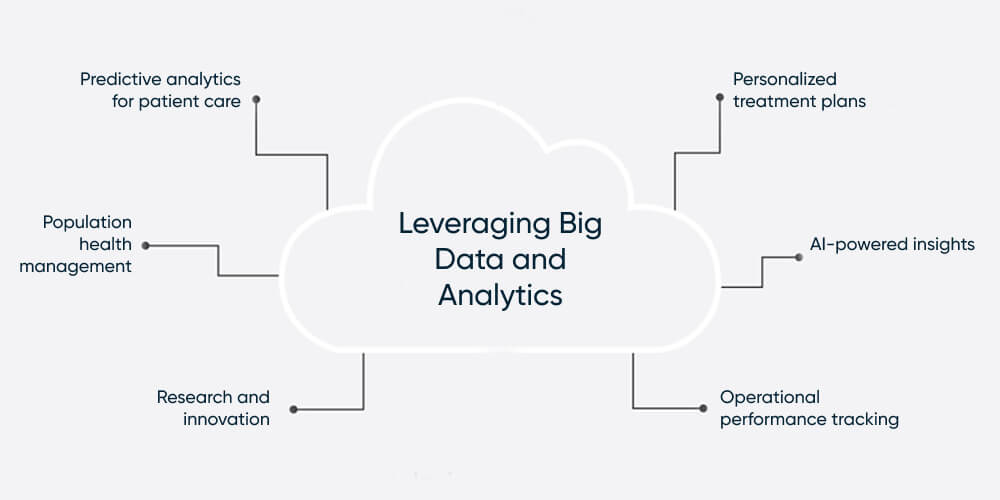
Data is one of the most powerful tools in modern healthcare, and cloud platforms make it possible to process and analyze massive datasets efficiently. Here’s how providers benefit:
Predictive analytics for patient care
Cloud-based big data tools analyze patterns in medical histories, test results, and treatments to predict potential health risks, enabling early intervention and reducing the chances of avoidable hospitalizations.
Personalized treatment plans
With large-scale patient data securely stored on the cloud, doctors can create tailored treatment strategies that address individual needs, leading to more precise care and better recovery outcomes.
Population health management
Providers can analyze data from thousands of patients at once, identifying public health trends, tracking disease outbreaks, and creating preventive strategies that benefit entire communities.
AI-powered insights
Many healthcare organizations leverage AI and machine learning tools hosted on the cloud to identify hidden patterns, optimize workflows, and support clinical decision-making with real-time recommendations.
Research and innovation
Cloud-based analytics allow healthcare researchers to collaborate globally, sharing anonymized data to accelerate clinical trials, drug development, and studies that improve treatment methods worldwide.
Operational performance tracking
Beyond clinical use, data analytics on the cloud help hospitals track financial performance, patient satisfaction, and resource utilization, enabling smarter decisions that reduce inefficiencies and costs.
Is Your IT Infrastructure Holding You Back?
Eliminate costly servers and outdated systems. Shift to flexible, cloud-based platforms designed for growth, compliance, and efficiency.
Cost Efficiency and Scalability
Adopting cloud solutions helps healthcare providers save costs while maintaining flexibility. With cloud computing in healthcare, organizations can scale resources according to their needs. Here’s how it creates value:
Reduced infrastructure investment
Traditional on-premise servers require heavy investments in hardware, maintenance, and upgrades. Cloud systems eliminate most of these costs by offering secure, outsourced infrastructure that scales without added expenses.
Pay-as-you-go pricing models
Cloud platforms allow healthcare providers to pay only for the resources they use, making it a cost-effective option for hospitals and clinics of all sizes.
Elimination of IT maintenance burdens
With cloud vendors handling server maintenance, security patches, and system updates, healthcare teams can focus on patient care instead of technical issues.
Flexible storage solutions
Cloud services can expand storage instantly as data grows, helping organizations manage increasing amounts of patient information without delays or expensive storage expansions.
Scalability for growth
Whether it’s expanding into new branches or handling seasonal spikes in patient volume, cloud solutions make it easy for providers to scale their operations seamlessly.
Improved resource allocation
With reduced IT overhead, healthcare organizations can direct funds and staff time toward improving care delivery, hiring skilled professionals, or investing in advanced medical technologies.
Disaster Recovery and Business Continuity
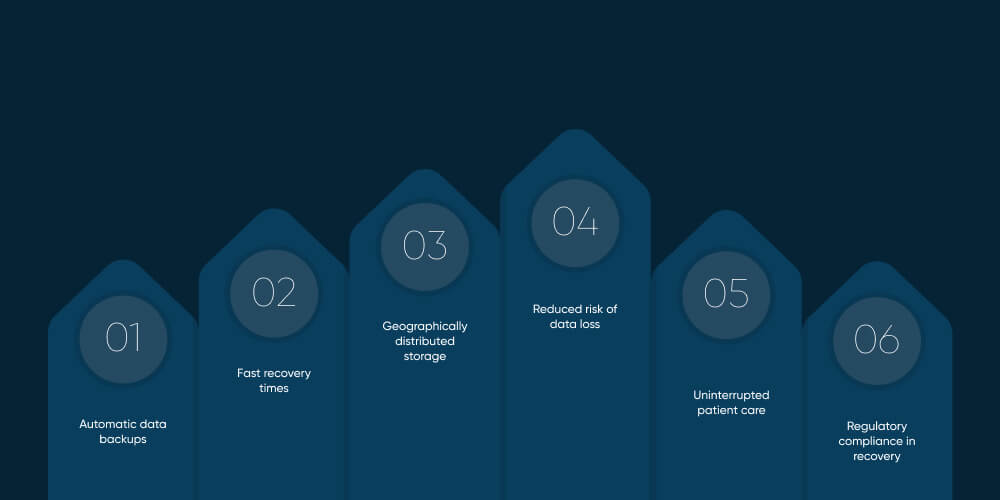
Healthcare organizations cannot afford downtime, especially when patient lives are at stake. Cloud computing for healthcare ensures resilience by supporting disaster recovery and business continuity in the following ways:
Automatic data backups
Cloud platforms provide automated backups across secure data centers, ensuring that critical patient information is always retrievable even if local servers fail due to technical issues or human error.
Fast recovery times
In the event of a system crash, cyberattack, or power outage, cloud systems allow healthcare providers to restore data quickly, minimizing disruptions to patient care and administrative functions.
Geographically distributed storage
Cloud vendors often store data in multiple secure locations worldwide, reducing the risks associated with natural disasters or regional outages that could otherwise halt operations.
Reduced risk of data loss
Unlike traditional systems, which rely on physical storage vulnerable to damage, cloud systems offer redundant storage that protects against permanent loss of sensitive healthcare information.
Uninterrupted patient care
Even during emergencies, healthcare teams can access essential medical records and continue providing care, ensuring that patients do not experience dangerous delays in treatment.
Regulatory compliance in recovery
Cloud-based disaster recovery solutions are often designed with compliance frameworks in mind, ensuring that recovered data remains secure and meets healthcare regulations after restoration.
What’s Your Disaster Recovery Plan Today?
Cloud solutions guarantee business continuity, automated backups, and faster recovery, keeping critical healthcare services uninterrupted.
Enabling Innovation in Healthcare Delivery
Innovation is one of the strongest advantages of adopting cloud computing healthcare systems. By providing flexible infrastructure, the cloud allows healthcare organizations to explore new ways of delivering care:
Integration with IoT devices
Wearables and connected medical devices send real-time patient data to the cloud, giving providers continuous insights into patient health and enabling proactive, personalized care strategies.
AI-driven diagnostics
Cloud platforms support powerful AI algorithms that can process large medical datasets, assisting doctors in diagnosing conditions faster, identifying risks earlier, and improving treatment accuracy across specialties.
Faster clinical research
Cloud-based platforms enable researchers to share anonymized datasets, collaborate across borders, and accelerate the pace of clinical trials, ultimately leading to quicker development of new treatments.
Improved patient engagement tools
From mobile apps to self-service portals, cloud solutions empower patients to schedule appointments, access records, and track progress, strengthening trust and communication with providers.
Support for advanced imaging
Cloud infrastructure can store and process high-resolution medical imaging data, allowing radiologists and specialists to collaborate remotely on complex cases without performance issues.
Foundation for future growth
By adopting cloud solutions, providers create a scalable foundation that supports ongoing advancements, ensuring they remain ready to embrace future healthcare innovations with minimal disruption.
How DITS Can Help with Cloud Computing in Healthcare
Choosing the right technology partner is critical for successful cloud adoption in healthcare. At DITS, we specialize in delivering secure, scalable, and innovative solutions tailored to providers’ needs. Here’s how we can help
At DITS, we integrate AI across all phases of development—from building applications to testing and quality assurance—ensuring smarter, faster, and more reliable cloud-based healthcare solutions.
We design and implement custom healthcare solutions that adapt to your organization’s workflows, helping providers achieve seamless integration with existing systems while meeting compliance requirements.
Many providers still rely on outdated infrastructure. With our Legacy Modernization Services, we migrate these systems to cloud-based platforms, improving performance, security, and long-term scalability.
Our expertise in IoT and cloud allows us to integrate remote patient monitoring tools that give providers real-time visibility into patient health, enabling proactive care and intervention.
We design cloud systems with HIPAA, GDPR, and other compliance standards in mind, ensuring patient data remains protected while maintaining operational transparency and trust.
From consultation and development to deployment and ongoing support, DITS works closely with healthcare providers to ensure cloud adoption delivers measurable improvements in efficiency, innovation, and patient care.
Ready to Reimagine Healthcare with Innovation?
Cloud computing fuels AI diagnostics, IoT monitoring, and research acceleration. Lead the future of healthcare delivery with confidence.
Conclusion
The adoption of cloud computing in healthcare has transformed the way providers manage patient data, deliver care, and innovate for the future. From streamlining EHR systems to supporting telemedicine, enhancing data security, and enabling advanced analytics, cloud solutions are reshaping healthcare delivery at every level. By combining scalability, efficiency, and innovation, healthcare organizations are better equipped to improve patient outcomes and operational performance.
At DITS, we go beyond standard cloud adoption by integrating AI into every solution we build—whether it’s for software development, quality assurance, or maintaining code quality. With our expertise in cloud-based modernization, we help healthcare providers unlock the full potential of cloud platforms to deliver smarter, safer, and more personalized care.
FAQs
1. How is cloud computing used in healthcare today?
Cloud systems are widely used for EHR management, telemedicine, remote monitoring, data security, big data analytics, and disaster recovery, making them an essential part of modern healthcare delivery.
2. What are the main benefits of cloud computing in healthcare?
The benefits of cloud computing in healthcare include cost savings, scalability, improved collaboration, stronger data security, better patient engagement, and the ability to adopt innovations like AI and IoT.
3. What are the types of cloud computing in healthcare?
The types of cloud computing in healthcare typically include public, private, and hybrid models. Each has unique advantages, depending on the organization’s size, compliance needs, and budget.
4. Can small healthcare clinics benefit from cloud adoption?
Yes. Smaller clinics gain affordable access to secure storage, advanced communication tools, and scalable solutions without heavy IT investments, allowing them to improve patient services and operational efficiency.
5. How does healthcare cloud computing support telemedicine?
Cloud computing for healthcare enables secure video consultations, integrates sessions with patient records, supports remote monitoring, and provides the scalability needed to manage spikes in virtual care demand.
6. Can you customize cloud-based healthcare solutions to fit our specific workflows?
Yes. DITS specializes in custom healthcare solutions that align with your operational needs, integrating with EHRs, telemedicine platforms, and monitoring tools to improve efficiency and patient care.
7. How do you ensure compliance with healthcare regulations like HIPAA or GDPR?
We design every solution with compliance frameworks in mind. From data encryption to secure access controls, our systems meet the highest industry standards for healthcare data protection.
8. Do you offer support for remote patient monitoring systems?
Absolutely. We integrate remote patient monitoring tools with cloud platforms, enabling real-time data collection and proactive interventions that improve care outcomes for patients with chronic conditions.
9. What role does AI play in your cloud computing healthcare solutions?
At DITS, we integrate AI into development, testing, and customization. AI helps improve automation, enhance quality assurance, and provide smarter insights for patient care and business operations.
10. How do you handle legacy modernization for healthcare organizations moving to the cloud?
Through our Legacy Modernization Services, we migrate outdated systems to secure cloud platforms, ensuring better scalability, compliance, and improved performance without losing critical data or functionality.

Nidhi Thakur
With more than 19 years of experience - I represent a team of professionals that specializes in the healthcare and business and workflow automation domains. The team consists of experienced full-stack developers supported by senior system analysts who have developed multiple bespoke applications for Healthcare, Business Automation, Retail, IOT, Ed-tech domains for startups and Enterprise Level clients.
Recent Posts

Explore predictive maintenance software features that reduce downtime, cut costs, and boost efficiency with enterprise-grade, AI-powered maintenance systems.
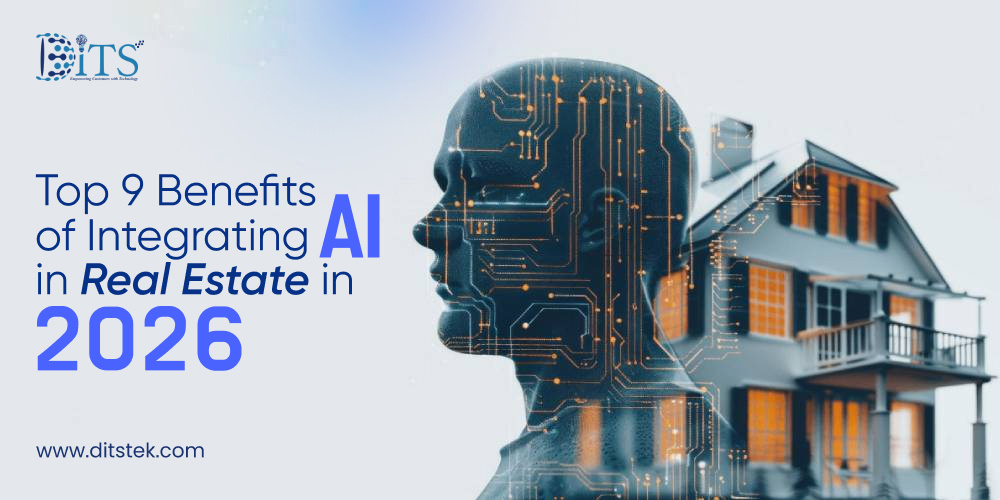
Benefits of AI in real estate include better cash flow planning, improved marketing ROI, stronger pipeline visibility, and scalable growth.

We at DITS offer custom Population Health Management Software Solutions to help you measure the effectiveness and efficiency of care delivery to patients. Read our blog to know in detail.